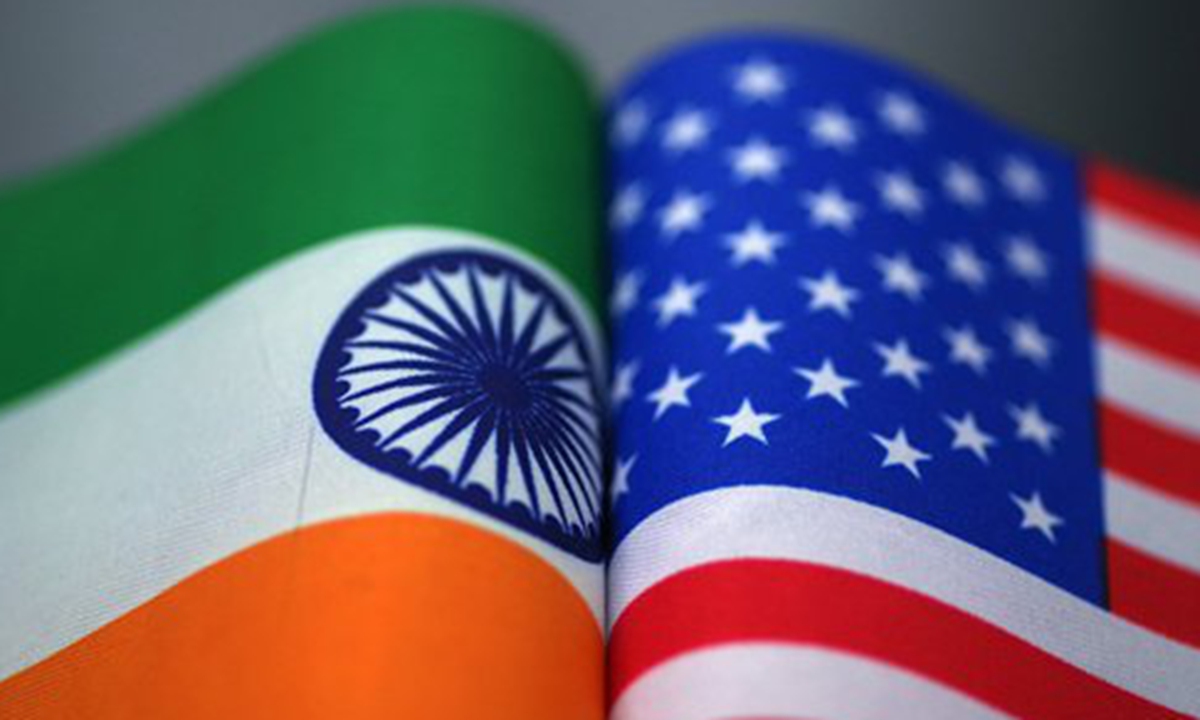Quad unlikely to evolve beyond a point because of lack of common goals: Indian scholar

Photo: IC
Editor's Note:With India having moved closer to the US in recent years, there have been some voices in India saying New Delhi should abandon its non-alignment policy and tie itself firmly to the US in order to cope with the challenges posed by China's development. Will New Delhi completely abandon its non-alignment policy? Although India and the US share a common goal of containing China, will India give up its strategic autonomy in the Indo-Pacific region? Global Times (GT) reporter Xu Yelu talked to Manoj Joshi (Joshi), a distinguished fellow at the Observer Research Foundation based in India, in a written interview.
GT: In recent years, India's strategy and foreign policy appear to have increasingly tilted toward the US. Many regard India and the US as quasi-allies, believing that India is moving further away from its non-alignment policy. What do you think of this view?
Joshi: I think India and the US have important relations, but the US is not a security provider for India. India has its own military and nuclear weapons to provide security. So it is not really interested in any kind of a military alliance with the US. Large countries like India, Brazil, China and Russia do not usually get aligned permanently to any country. The concept of non-alignment is dated. Today, countries establish flexible coalitions to serve their foreign policy interests.
GT: India is one of the important pillars of the US' Indo-Pacific Strategy. However, some people believe that the US has not given India any real benefits. How do you view the gains and losses of India from the US' Indo-Pacific Strategy?
Joshi: India is perhaps the most important pillar of the Indo-Pacific Strategy, but India's security concerns are larger and are in the main along its land border and the north Arabian Sea where India and the US have no cooperation. Indo-Pacific Strategy meshes well with India's Act East policy and is seen by New Delhi as a largely economic policy. Under the Biden leadership, the Indo-Pacific Strategy will be a comprehensive one, involving economic policy, trade, pandemic relief, climate change, humanitarian relief and infrastructure development. This could benefit India in the future, especially the idea of creating new international technology partnerships in areas like 5G, AI, quantum computing, and so on. India could also benefit from the Australia-Japan-India supply chain initiative.
GT: Quad recently held its first leaders' summit. The Quad countries seem to share some common goals, but there are also differences among them. How do you think Quad will evolve?
Joshi: The Quad countries also have great differences. It is unlikely to evolve beyond a point because the countries do not have common goals. Australia has no concern with India's security challenges; the US is not threatened by China, but seeks to maintain its geopolitical primacy in the Western Pacific. India and Japan have border disputes with China, but Japan has US security cover, India does not. But all of them have a common goal of maintaining a balance of power to check China. This is not likely to have a military solution, but one which stresses coordination of policies on different areas. It is not the emphasis to outcompete China in the economic and technology front.
GT: In the Trump era, the personal relationship between Indian Prime Minister Narendra Modi and former US president Donald Trump is one of the factors that brought the US-India relationship closer. How do you predict the future of US-India relations under the Biden presidency?
Joshi: There is a geopolitical congruence of interest between the two in balancing China. But there is also a huge asymmetry of power, India is a poor and weak country compared to the US. Its role can only be limited. But like all weak countries it will seek to take advantage of the rift between its more powerful interlocutors like the US and China to promote its own geopolitical and economic ends. Also Modi may not be able to develop the kind of personal relationship he had with Trump. There are also issues relating to religious freedom and human rights which may create problems for India in the US.
GT: India, a populous country, is also seen as having great growth potential and has always had great power ambitions. Do you think India's strategy of tying itself to the US' chariot is a short-term strategy or a long-term one? What is the best strategy route in India's interest?
Joshi: I think India should learn from China. Between 1972 and 2000 or so, China was a quasi-ally of the US. And over the years China got great benefits from the US connection. So, it is not a bad idea to use the US chariot to move ahead. In international relations, as is well known, there are no permanent friends and enemies, only permanent interests.

